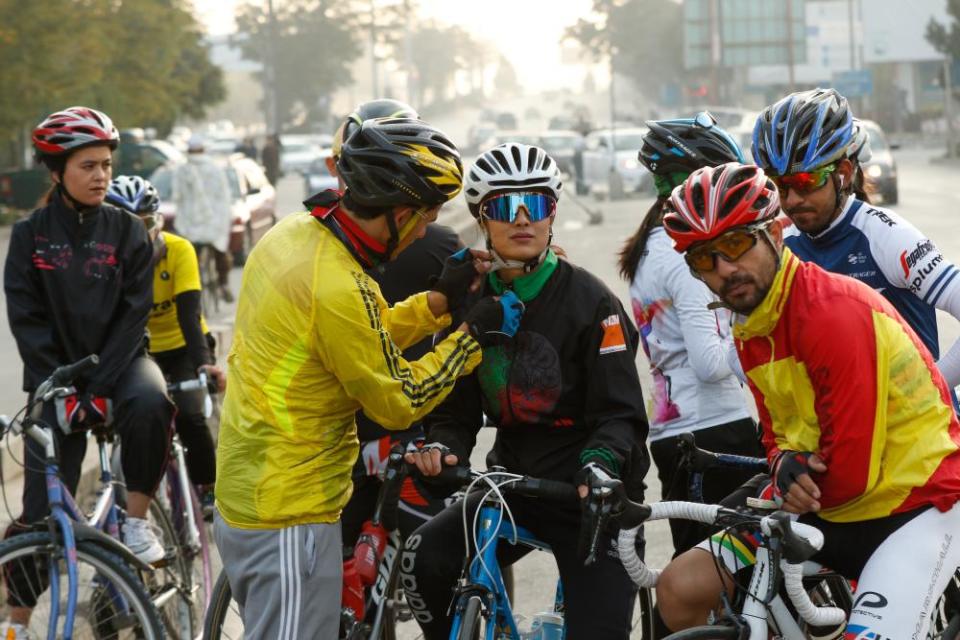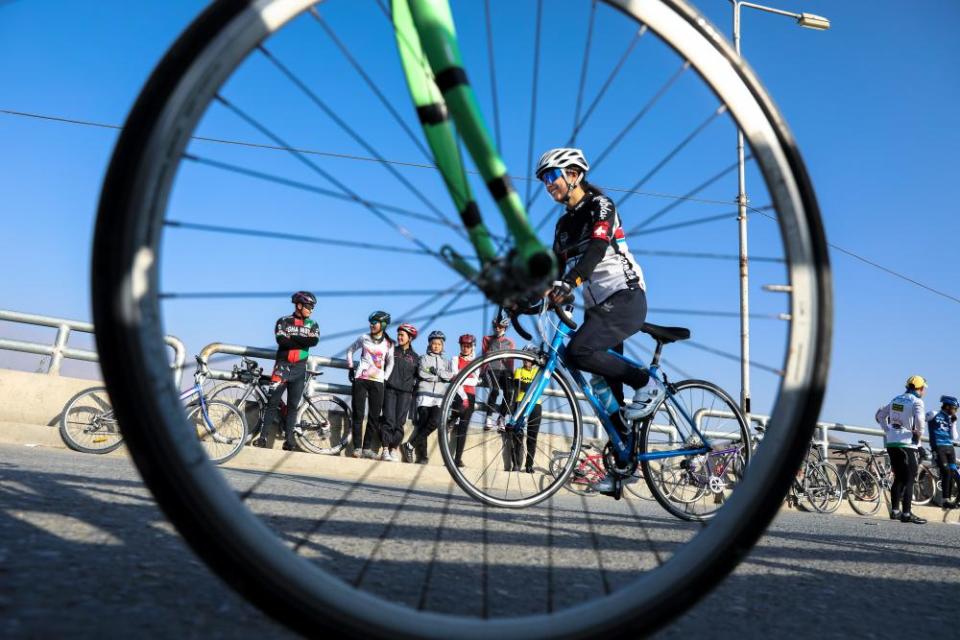‘We’re so proud of her’: Afghanistan’s gutsy female cyclists ready to cheer on Ali Zada
When Masomah Ali Zada makes her Olympic debut at the women’s cycling time trial this week, speeding her way around the 22km route with Mount Fuji in the background, it won’t just be her teammates in Japan cheering her on. In Kabul, where the 25-year-old joined the national squad as a teenager, a small but gutsy group of female cyclists will be glued to the television, willing her to do the best she can.
“I’m really, really proud of her and so are all of the team members, and we are really looking forward to watching her race and seeing her do great,” says Zahla Sarmat, assistant development director of the Afghan cycling federation’s women’s division. For her and her fellow riders, Ali Zada is a source of huge inspiration, even if her sporting success eventually led her to leave Afghanistan and claim asylum in France. She is competing in Tokyo as part of the Refugee Olympic Team.
“One of the really crucial things that she represents is women’s empowerment in Afghanistan because I’ve watched her go through so many struggles as a cyclist, just because she’s a woman,” says Sarmat, 21, who has ridden alongside Ali Zada at home and in competitions overseas. “And to see her making it that far; it really makes me proud and kind of emotional as well.”
She represents women’s empowerment in Afghanistan, I’ve watched her go through so many struggles as a woman cyclist
Zahla Sarmat
Ali Zada’s moment in the spotlight comes at a delicate time for her fellow cyclists in Afghanistan, where violence has escalated since US President Joe Biden announced that all US troops would be gone by 11 September. In fact, almost all of them have already pulled out, along with the British, and Taliban fighters have launched a series of major offensives, taking districts and important border crossings and encircling several provincial capitals.
The apparent inability of the Afghan army to keep the militants at bay has reportedly prompted US intelligence agencies to revise their estimate of how long it could take for the government to collapse: the current thinking is as little as six months after the departure of the last American troops. Such a scenario would spell disaster for women in Afghanistan, who live in fear of a return to Taliban rule. Even if it doesn’t come to pass, a continued rise in violence could be enough to force Ali Zada’s old teammates in Kabul off the road.
“I really pray for the country to be a safe place for a woman like us, especially [for us to be able] to ride bikes on the streets,” says Rukhsar Habibzai, captain of the women’s team. “But I’m quite sure that the Taliban groups, the [Islamic State] and all of them, will never allow women to even study, to work, to have a job. So how is it possible they will let us do biking? I’m quite sure that they will never allow us; they will just shoot us.” She lets out a grim half-laugh.

Habibzai, 24, fell in love with cycling aged nine, when, as a child growing up in the restive south-eastern province of Ghazni, she somehow managed to learn to ride and found “it gave me a very nice feeling that I am quite free, as if I have wings to fly, as if I have no fear on this earth.”
“It gave me, I can say, the food to my soul. Ever since then biking became a part of my life,” she says.
The elders in her family, who moved to Kabul in 2012, were reluctant at first, out of concerns for her safety. Such fears are understandable: female cyclists face both verbal and physical harassment every time they go out. “The men, especially those who saw us for the very first time, they would throw stones at us, they would hit us [with] their cars,” recalls Habibzai.
Local shopkeepers would throw their vegetables at us; I’ve been hit by potatoes, by apples, and so many other things
Rukhsar Habibzai
“Local shopkeepers, beside the roads, would throw their vegetables [at] us; I’ve been hit by potatoes, by apples, and so many other things; whatever they had in their hands to throw at us. And they use very abusive words for us, very embarrassing. So, we would sometimes feel very ashamed of even being a girl.”
To try to avoid the hostility, many of the female riders have got used to going out in the early hours, from about 5am until 8am.
Sarmat has learned to her cost what can happen when she doesn’t. “There was one time that I was attacked,” she says. “It was Ramadan. And because we couldn’t go cycling during the day because everyone was fasting and it was really difficult to ride, especially with the hot weather, we used to go after the dinner, iftar. There was one night I went with one of my male teammates, and there were a couple of guys on the street … and somebody just pulled me off the bike.”
Despite all these troubles, despite the disapproval of family members and the abuse of strangers, cycling among women has grown in popularity, they say, from a tiny group a decade ago to a 220-strong female contingent within the cycling federation. There are seven women’s provincial teams and an annual women’s race is held in Kabul every summer. Women aren’t necessarily getting involved because they want to become part of the national team, says Habibzai; they are doing it for pleasure, for fun, because they can.
All this progress, however, like so much else in Afghanistan, is now hanging in the balance.
Habibzai says that for two months now she has felt unable to go out training on the long-distance routes out of the capital she used to take, for instance to Bagram, where until recently the US had its main airbase. Such are her fears about the security situation that she feels confined to her local neighbourhood. “I’m currently suffering from a great depression,” she says.
“It is not easy for us, not for me and for other girls as well, to ride bikes these days … Ever since the US army announced their departure the situation became worse and … we are in danger, to be honest.”
According to the UN Assistance Mission in Afghanistan (Unama), the total number of casualties during the first quarter of this year was 1,783 (573 killed and 1,210 injured), a 29% rise on the same period in 2020. There was also a significant increase in the number of casualties among women and children.
Sarmat says that a rise in targeted killings is particularly frightening for a group of women who, as she puts it, “whether [they] like it or not, are making a political statement every time [they] go out on the bike”.
“Many people know the members [of the national cycling team], because these are the girls who are the pioneers of this sport in Afghanistan,” she says. “So it’s really scary to go along for training because of everything that has been happening.”

Both Habibzai and Sarmat have big dreams for the future. The former is studying to become a dentist and has recently founded the women-only Cheetah cycling club. The latter splits her time between Afghanistan and Singapore, where she hopes to study astrophysics at graduate school and then bring back that expertise to her home country.
Both, of course, want to keep on cycling. Whether the Afghanistan of tomorrow will be stable and peaceful enough for them to do so is another question entirely. In the meantime, just the act of getting on their bikes remains a defiant and intrinsically political act.
“When you ride within the city the women around us, the girls around us, seem quite motivated,” says Habibzai. “It shows that we are free to do anything. So what are we symbolising is actually peace, in a country that … for decades has suffered from wars. It’s a place where women were not given any rights to even drive a car, but we are riding bikes.”

 Yahoo Finance
Yahoo Finance 